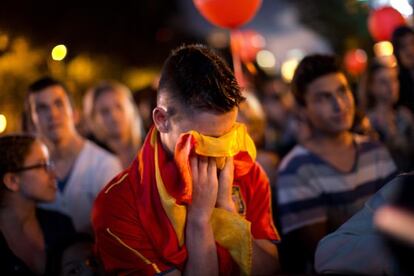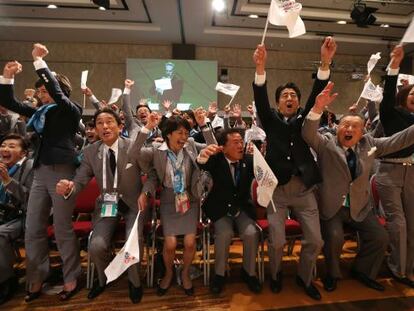Third time unlucky for Madrid, as 2020 Olympics go to Tokyo
Shock among Spanish delegation as city's bid loses out in the first round of voting Doping and the dire state of the economy thought to have been the weak points


Tokyo was successful with its bid for the 2020 Olympics on Saturday night, beating out rival cities Madrid and Istanbul. To the shock and surprise of the Spanish team, Madrid was eliminated in the first round, after a tie with Istanbul – 26 votes for each compared to the 42 garnered by Tokyo, which proved to be well ahead in the voting right from the start. The Spanish capital ended up with 45 votes in favor and 49 against in the vote to settle the stalemate. In the final vote, Japan beat out Turkey by 60 votes to 36.
The winning candidate is the most solvent in terms of its economy, and also showed itself to be the most expeditious in the fight against doping in sport. The Madrid team boasted of having 80 percent of the necessary infrastructure already in place. But Japan brought that to the table and more, with the Spanish delegation unable to emerge from under the shadow of the doping scandals that have hit the headlines in recent years. What’s more, the economic crisis that still refuses to loosen its grip on the country weighed heavily on the Madrid candidature. It was a crushing blow for the Spanish team, who not only lost out for the third time in a row, but also did so when the hopes for victory were even greater than when they fought to host the 2012 and the 2016 games.
Istanbul promised a “zero-tolerance policy” toward doping. But over the last three months, 32 positive drug tests have come to light, and the Turkish city could not offer a reasonable explanation as to why. Spain avoided any mention of doping during its presentation. But two delegates asked the Madrid team about the issue, with specific mention of Operation Puerto, a Civil Guard investigation into sports doping in Spain that concluded this year, with a very light sentence for those found guilty of involvement.
The Madrid team boasted of having 80 percent of the necessary infrastructure in place. But Japan brought that to the table and more
In contrast, Tokyo could boast of a highly relevant claim to fame: not one single Japanese Olympian has ever tested positive for doping. The city also alluded to the honesty of its citizens. “If [visitors] lose something, they will get it back, even their money,” explained a member of the Japanese team. “Last year more than $30 million in cash was handed over to the police.”
But Tokyo had another secret weapon: its own funds. The Madrid team explained that it only lacked investment of 1.5 billion euros over the next seven years, an amount that it argued could be raised between the city council, the regional government and the central government. But the Madrid bid never specified exactly how it would deal with this investment. Japan explained that it needed 3.4 billion euros to complete its bid, but it could put the money on the table right now if need be. “This is not a budget, it’s a fund that is ready to be used from tomorrow,” explained one of the Japanese delegates.
This was the second time in a row that Tokyo had aspired to host the Games, and the third time in a row for Madrid, which had already tried its luck and failed in 2005 and 2009. With the country mired in the economic crisis, and the seemingly never-ending cases of political corruption, Spain needed something to hope for, the Madrid delegation argued. But the IOC didn’t see fit to grant Madrid its wish. The government will now have to continue to battle against unemployment figures of 6.2 million people, with no positive stories of an Olympic future to serve as a distraction. Prime Minister Mariano Rajoy, meanwhile, will have to continue answering (or avoiding) questions about his involvement in the Bárcenas scandal, in which he is alleged to have accepted irregular cash payments from a slush fund run by the Popular Party’s former treasurer Luis Bárcenas. And the Madrid city council will now have to deal with its eight billion euros of debt, relying only on the resources it can secure in Spain.
Spain avoided any mention of doping during its presentation. But two delegates asked the Madrid team about the issue
The Spanish delegation had tried to make the rigors of the crisis work in its favor. It did not need huge sums of money, it argued, because practically everything that was needed had already been invested. The strategy was based on the solvency of a project that was only lacking 1.5 billion euros of investment and 20 percent of the necessary infrastructure.
But when the 45-minute presentation was over, and it was time for questions for Spain, the IOC delegates avoided asking about the crisis and focused instead on the fight against doping. Adam Pengilly, from the UK, said: “A few sportsmen have requested that I ask about the progress of Operation Puerto, and about the destruction of blood samples.”
Pengilly was referring to the more than 200 blood bags that Dr Eufemiano Fuentes and his colleagues had hidden in two apartments in Madrid – i.e., the blood bags from Operation Puerto. The investigation was condemned by a number of international media outlets and sports stars as “the biggest cover-up in the history of sport.” After seven years of investigation and three months of court hearings, the sentence handed down by Judge Julia Patricia Santamaría was tame to say the least. Of the five accused, three were absolved and two given minimum sentences. What’s more, the judge ordered the 212 bags of blood and plasma that had been seized to be destroyed, thus eliminating the possibility of identifying and punishing the sportsmen and women who had been doping. As the sentence was appealed by the public prosecutor, the blood bags have not yet been destroyed. But Pengilly specifically asked about the destruction of this evidence. And no one from the Madrid delegation managed to tell him that they were yet to be destroyed.
This was the second time in a row that Tokyo had aspired to host the Games, and the third time in a row for Madrid
When the Operation Puerto sentence was made public, the president of the Spanish Olympic Committee, Alejandro Blanco, was in Buenos Aires and when asked about how it could affect Madrid’s bid, gave a very brusque answer. He also expressed his regret that the doping ring could overshadow all of the efforts that have been made in recent years to adapt Spain to international legislation on drugs cheats. On Saturday, when Blanco answered the IOC delegates, he sought to assure them that Spain had adapted its doping laws to the international standards. But he failed to address the question of the blood bags. In the subsequent press conference, he explained that Spain was sixth on the global list in terms of the number of doping tests. And he mentioned the blood bags: “We are in the middle of a judicial process and until that process finishes the judge will not decide what to do with the blood bags. […] We won’t stop fighting until we know the name of all those involved.” But it was too late. The IOC delegates, it seemed, had not been convinced by any of the explanations offered.
For Tokyo, the intelligent way the delegation dealt with the nuclear emergency at the Fukushima plant worked in its favor. Rather than avoiding talking about what had happened, it spoke about the disaster in the context of needing something “to dream about” after so many tears. The power of Japan’s economy did the rest. In the first round, the city’s 42 votes were close to an absolute majority, which would have eliminated the need for more rounds. But in the second, definitive round, its 60 votes gave it the clear edge over the 36 of Istanbul.
Tu suscripción se está usando en otro dispositivo
¿Quieres añadir otro usuario a tu suscripción?
Si continúas leyendo en este dispositivo, no se podrá leer en el otro.
FlechaTu suscripción se está usando en otro dispositivo y solo puedes acceder a EL PAÍS desde un dispositivo a la vez.
Si quieres compartir tu cuenta, cambia tu suscripción a la modalidad Premium, así podrás añadir otro usuario. Cada uno accederá con su propia cuenta de email, lo que os permitirá personalizar vuestra experiencia en EL PAÍS.
En el caso de no saber quién está usando tu cuenta, te recomendamos cambiar tu contraseña aquí.
Si decides continuar compartiendo tu cuenta, este mensaje se mostrará en tu dispositivo y en el de la otra persona que está usando tu cuenta de forma indefinida, afectando a tu experiencia de lectura. Puedes consultar aquí los términos y condiciones de la suscripción digital.









































